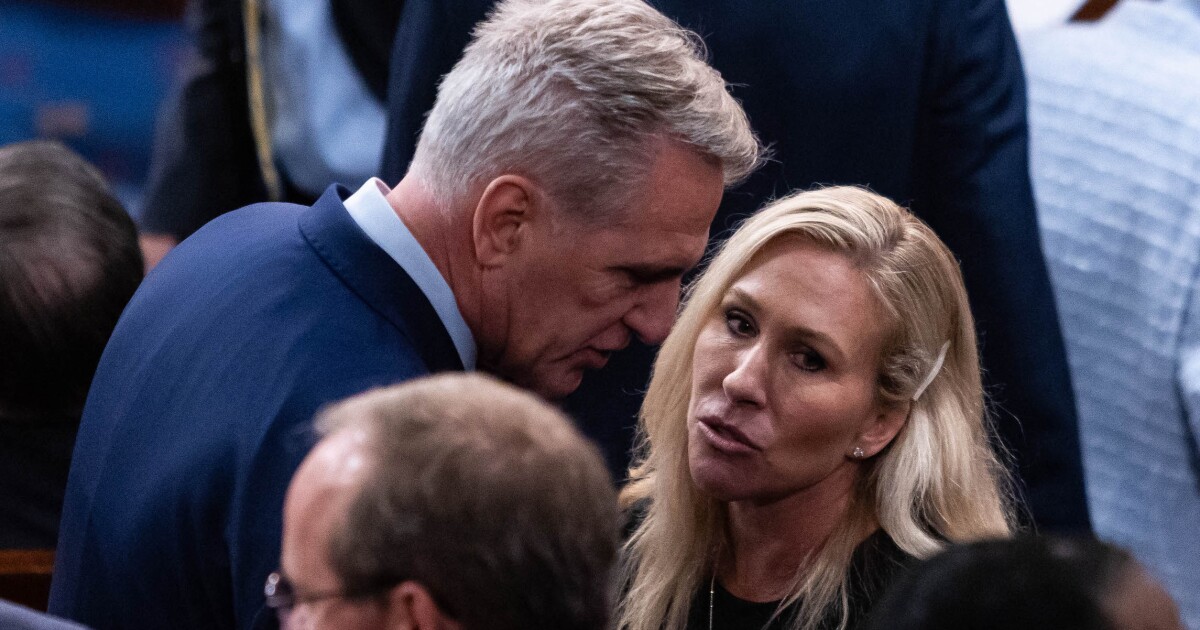

What transpired in Pennsylvania’s race for House speaker hasn’t happened on Pennsylvania Avenue — yet.
Nevertheless, intraparty divisions are putting the new Republican House majority’s ability to elect a speaker in doubt.
Conservative defections did lead to Rep. Hakeem Jeffries (D-NY), the expected minority leader, receiving more votes for speaker in the early going than Rep. Kevin McCarthy (R-CA). The House adjourned with no one getting the required majority for the speakership.
GOVERNING VS. GRIEVANCE: THE GROWING REPUBLICAN DILEMMA
Jeb Bush warned that Donald Trump was a “chaos candidate” before the businessman and reality TV star became the Republican nominee and president. This GOP House majority may be the chaos Congress. A few factors are in play as the chamber gets ready to start all over again Wednesday afternoon.
Kevin McCarthy has a conservatives problem
McCarthy has bested former House Speakers John Boehner (R-OH) and Paul Ryan (R-WI) in one regard: He is facing a conservative revolt even earlier than either of them did. Nor is this McCarthy’s first time facing this predicament.
In 2015, McCarthy was poised to succeed Boehner after conservatives pushed the Ohio Republican out of the big chair. But these conservatives weren’t done, threatening to withhold their support from McCarthy. Enter Paul Ryan, who took up the gavel. The Californian stayed on as majority leader, then ascended to the top spot as minority leader when Democrats took the House and Ryan departed for greener pastures.
A subset of conservatives hasn’t warmed to McCarthy in the years since, denying him the votes to become speaker on multiple ballots on Tuesday. Some want reforms to how the House does business, some want a different speaker, and still others just want someone in leadership to pay a price for Republicans underperforming in the midterm elections. It won’t be Senate Minority Leader Mitch McConnell (R-KY), so McCarthy becomes the logical sacrifice bunt.
The GOP is in transition
Republicans are in the process of a messy breakup with the U.S. Chamber of Commerce and the party’s business wing. But the transformation into a populist workers’ party isn’t complete.
In the midterm elections, the GOP gained ground with Hispanic and black voters but still lost both blocs, while Democrats largely sustained their momentum with white suburbanites Republicans shed under Trump. This became a problem in a number of key races, with Republicans failing to win majorities in some contests and requiring considerable resources to get over the finish line in others that should have been easily winnable. Republicans ended up losing a Senate seat and having a much smaller House majority as a result.
This has also complicated McCarthy’s pitch to the whole caucus and given populists like Rep. Matt Gaetz (R-FL) renewed incentives to oppose him.
Freedom Caucus support isn’t free
The Freedom Caucus was founded when some House Republicans felt the Republican Study Committee had gotten too big to be an effective conservative pressure group within the GOP conference. They were willing to withhold support from legislation as a way of pushing House Republicans to the right on various issues, especially federal spending.
Sometimes, however, that meant legislation would end up passing with Democratic votes even when Republicans were in charge of the House. Other times, it led to resentment among a majority of Republicans who felt they were being run by a minority of the caucus.
Rep. Scott Perry (R-PA), the Freedom Caucus’s current chairman, and Rep. Andy Biggs (R-AZ), a past one, are applying this tactic to the speaker’s vote. Perry now says McCarthy has missed his window to become speaker. Only five defections are sufficient to defeat the California Republican since the new House majority is so narrow.
Freedom Caucus members overwhelmingly hail from safe red districts, so they are unlikely to be harmed by national perceptions that GOP ideological infighting renders the party incapable of governing.
It don’t mean a thing if it ain’t got that swing vs. All about the base
Republicans also have a fundamental split over what went wrong in the midterm elections. Some want to pursue a base mobilization strategy, arguing that Senate GOP compromises demoralized conservatives and opposition to things like ballot harvesting handcuffed get-out-the-vote efforts. How important is candidate quality really when Democrats can consistently win the nominees like President Joe Biden and Sen. John Fetterman (D-PA)?
Other Republicans say the votes were there but that the nominees in too many swing states and districts alienated the people who could have put the party over the top. In Georgia, for example, no other Republican statewide candidate lost besides Trump-backed Senate contender Herschel Walker.
Why does this matter for the speaker’s race? Because which problem Republicans consider most important helps determine what kind of leadership they need for the next two years. It will be the 2024 election before you know it, and every single member of the House will be up.
CLICK HERE TO READ MORE FROM THE WASHINGTON EXAMINER
The House is the first place where these battles will be fought this year as voters look for signs Republicans can coalesce and govern.
Just as the last two Democratic administrations did after losing control of the House, Biden’s team will shine a spotlight on anything showing otherwise.







